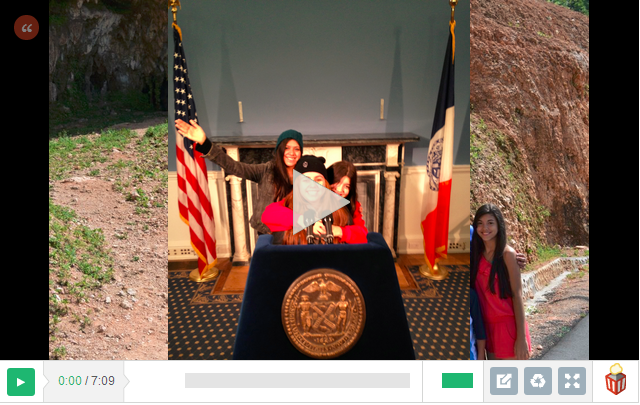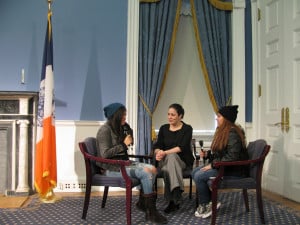Facing History in New York, in partnership with WNYC Radio’s Radio Rookies program, helps public high school students develop digital storytelling skills through the Neighborhood to Neighborhood project. Each year, students in the program tackle complex questions about identity, race, education, and crime and violence in their communities. Using interviewing skills and multimedia tools, the students produce original visual and audio pieces.This post is the third in a five-part series introducing their finished pieces. Each post will include connection questions you can use in your classroom to discuss the works or to start your own project. This week: Two friends look at the relationship between language and identity. Check back next Tuesday when we hear from a group of teens talking about how their fashion reflects their personality. Follow along!
How does language shape our identity?
Facing History student Grisel speaks Spanish at home with her mom in New York, and during the summers with her dad and cousins in Puerto Rico. She never thought it was a gift to be bilingual. But her close friend, Facing History student Aura had a very different experience. Aura’s Chilean parents chose to speak English with her when she was a little girl and, as a result, she can’t speak Spanish or communicate easily with her grandparents.
Watch and/or listen to Grisel and Aura’s multimedia investigation of identity, membership, and language:
Connection Questions:
- Rookie Reporter Aura expressed sadness about not being able to speak Spanish. What did she feel she had “lost”?
- Does this story change the way that you think about the relationship between language, identity, and membership?
- As an immigrant to this country, why might Aura’s mom have worked so hard to learn English?
- Rookie Reporter Grisel shared that while her mother speaks only Spanish, her younger sisters speak only broken Spanish. How might such differences affect family relationships? What other impact has the loss of language had on family relationships in this story?
- Aura agrees with her mom that all Latinos [in the United States] should learn how to speak Spanish. Based upon what you heard in this story, why might she and her mother hold this view? What does ethnicity have to do with language?
- Have you ever wanted to learn to speak another language? What motivated you? Was it easy or difficult to learn?
- Language is a big part of our identities. Is there anything that is as (or more) significant to your identity?
- All of the stories in the “Neighborhood to Neighborhood” project are available in two formats: audio only and audio-visual. Try listening to the story in both formats. How do the images (or their absence) shape the way you experience the story?
- Why do you think the series is called 'Neighborhood to Neighborhood'?
- How might this story be different if reported by adults?
Do It: Construct Identity Charts in Class to Explore Issues of Identity
The Neighborhood to Neighborhood Project was made possible by the Hive Digital Media Learning Fund in The New York Community Trust and The MacArthur Foundation.
Check out the rest of the "Neighborhood to Neighborhood" blog series!



